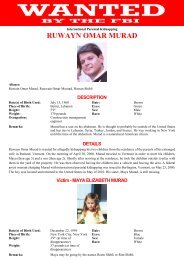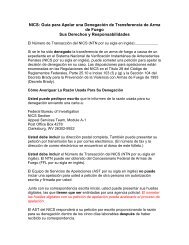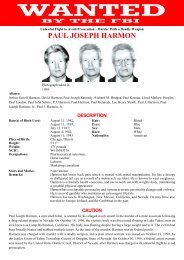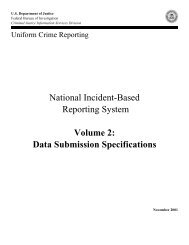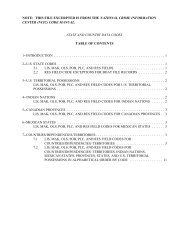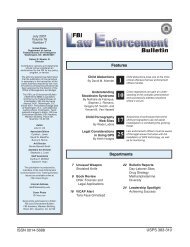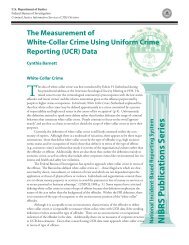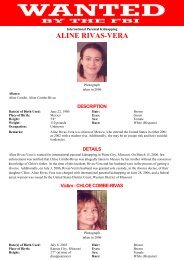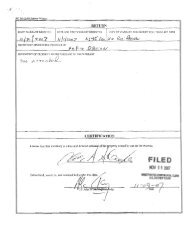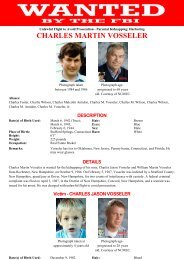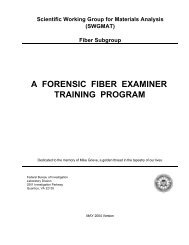F B I Law Enforcement Bulletin - June 2003 Issue
F B I Law Enforcement Bulletin - June 2003 Issue
F B I Law Enforcement Bulletin - June 2003 Issue
Create successful ePaper yourself
Turn your PDF publications into a flip-book with our unique Google optimized e-Paper software.
to strictly observe this distinction<br />
resulted in a possible suppression of<br />
the evidence.<br />
The “primary purpose” test led<br />
the FISA Court and the U.S. Department<br />
of Justice (DOJ) to adopt a<br />
policy of building a “wall” between<br />
intelligence investigators and<br />
criminal investigators for fear of<br />
tainting FISA court ordered surveillances.<br />
Intelligence investigators<br />
were not to discuss ongoing foreign<br />
intelligence or foreign counterintelligence<br />
investigations with criminal<br />
investigators. In this way, FISA orders<br />
could not be used by criminal<br />
investigators to avoid seeking Title<br />
III orders. This practice led to a<br />
critical lack of coordination in investigations,<br />
such as international<br />
terrorism cases, which have both intelligence<br />
and criminal aspects.<br />
FISA AS AMENDED BY<br />
THE USA PATRIOT ACT<br />
Following the September 11,<br />
2001, terrorist attacks, Congress reassessed<br />
intelligence-gathering<br />
procedures and passed the USA<br />
PATRIOT Act. The most significant<br />
changes involve the purposes<br />
for which FISA-authorized electronic<br />
monitoring and searches<br />
may be used and the exchange of<br />
information between criminal and<br />
foreign intelligence investigators.<br />
Previously, FISA-authorized<br />
electronic monitoring and searches<br />
only could be used if high-level<br />
executive officials certified that<br />
“the purpose” was to obtain foreign<br />
intelligence information. As noted,<br />
that language came to be interpreted<br />
as the “primary purpose”<br />
by the courts and DOJ. The USA<br />
PATROIT Act now requires that<br />
foreign intelligence information<br />
28 / FBI <strong>Law</strong> <strong>Enforcement</strong> <strong>Bulletin</strong><br />
gathering be a “significant purpose.”<br />
19 The act amends FISA so<br />
that intelligence officials may coordinate<br />
efforts with law enforcement<br />
officials to investigate or protect<br />
against attacks, terrorism, sabotage,<br />
or clandestine intelligence activities<br />
without undermining the required<br />
certification of the “significant purpose”<br />
of FISA orders. The result is<br />
that Congress rejected the idea of<br />
having a “wall” between foreign intelligence<br />
and law enforcement officials<br />
when the object of the investigation<br />
is to detect, prevent, or<br />
prosecute foreign intelligence<br />
crimes.<br />
On March 6, 2002, Attorney<br />
General John D. Ashcroft<br />
implemented the USA PATRIOT<br />
Act by establishing a new DOJ<br />
policy regarding information-sharing<br />
procedures. The new procedures<br />
permitted the complete exchange<br />
of information and advice<br />
between intelligence officers and<br />
law enforcement officers regarding<br />
FISA surveillances and searches.<br />
On May 17, 2002, the FISA<br />
Court rejected the attorney general’s<br />
new policy. 20 The FISA Court<br />
ruled that law enforcement officials<br />
cannot a) direct or control an<br />
investigation using FISA searches<br />
or surveillances for law enforcement<br />
objectives, b) direct or control<br />
the use of FISA procedures to enhance<br />
a criminal prosecution, c)<br />
make recommendations to intelligence<br />
officials concerning the initiation,<br />
operation, continuation or<br />
expansion of FISA searches or surveillances,<br />
or d) that representatives<br />
of DOJ’s Office of Intelligence<br />
Policy and Review (OIPR) be invited<br />
to (“chaperone” in the view of<br />
the DOJ) all meetings between FBI<br />
and DOJ’s Criminal Division to<br />
consult regarding efforts to investigate<br />
or protect against foreign attack,<br />
sabotage, or international terrorism<br />
to ensure that foreign<br />
intelligence gathering remains the<br />
primary purpose of any FISA-authorized<br />
technique. The FISA<br />
Court’s rejection of the new guidelines<br />
led to the first-ever appeal to<br />
the FISA Court of Review.<br />
In its decision, the FISA Court<br />
of Review decided that FISA does<br />
not preclude or limit the government’s<br />
use of foreign intelligence<br />
information, including evidence of<br />
crimes, in certain types of criminal<br />
prosecutions. 21 The court of review<br />
determined that the restrictions imposed<br />
by the FISA Court on the<br />
government are not required by<br />
FISA, as amended by the USA PA-<br />
TRIOT Act or by the Constitution<br />
and that the USA PATROIT Act<br />
amendments of the FISA statute do<br />
not violate the Fourth Amendment<br />
of the Constitution.<br />
The court of review made several<br />
important points. First, there<br />
must be a significant foreign intelligence<br />
information-gathering



